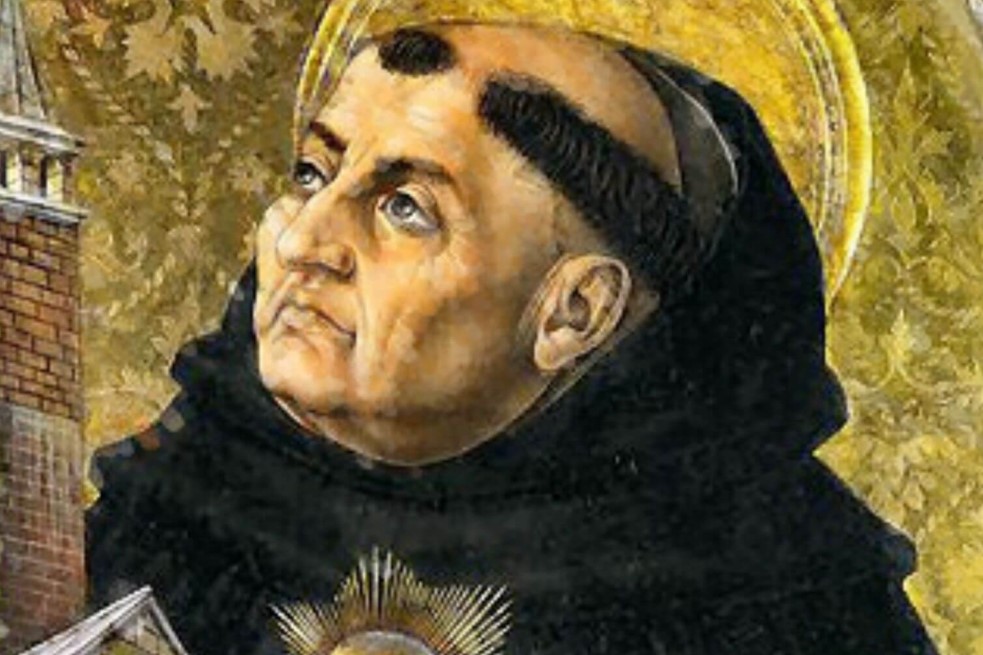
Saint Of The Day For January 28: Saint Thomas D’Aquin
St Thomas, who lived between 1225 and 1274, a Dominican friar, a great theologian known as the Doctor Angelicus, gave a philosophical foundation to Christianity by promoting trust in reason that harmonises with faith.
He is patron of Catholic schools, theologians and booksellers.
Thomas, imprisoned by family for becoming a preacher friar
Thomas was born to the Counts of Aquino, in the castle of Roccasecca, Basso Lazio, who were related to Emperor Frederick II.
His father Landolfo wanted him to be abbot of the Monastery of Montecassino, thinking of indulging both his son’s shy and gentle nature and his political designs, but Thomas wanted to become a Dominican friar in Naples, refusing all ambition and choosing a mendicant Order.
A shocking choice for his household.
Two brothers imprisoned him.
He was kept in a cell. Proverbial for his peaceful disposition, he became very uneasy when they brought a prostitute into the room to make him give up his vocation, so much so that he grabbed a burning embers and made her flee. In the end, it seems he managed to escape by lowering himself into a large basket with the help of his sisters.
An intellectual in love with God, St Thomas
He was then sent to Cologne, where he studied Aristotelianism with St Albert the Great, then to Paris where he taught at the University, not without difficulties with the secular clergy.
Back in Italy, he intensified his study of Aristotle thanks to the translations of a confrere and composed the well-known hymn linked to the feast of Corpus Christi, the ‘Pange lingua’.
He began writing his ‘masterpiece’, the Summa theologiae, with the five ways to prove the existence of God.
Central to his work is his trust in reason and the senses, philosophy is the handmaiden of theology, but faith does not nullify reason.
He loved study and it is not difficult to imagine that his endless philosophical-theological output caused a stir among contemporary theologians.
But one day, on 6 December 1273, Thomas told his brother Reginald that he did not want to write any more: ‘I cannot because everything I have written is like straw to me compared to what has been revealed to me’.
According to some biographers, a mystical conversation with Jesus preceded this decision.
Then he fell ill and in 1274, on his way to Lyon, where Pope Gregory X had wanted him for the Council, he died at the abbey of Fossanova. He was only 49 years old.
St Thomas read by Chesterton: faith-reason reconciliation
To him the famous English writer G. K. Chesterton, with his acuity, dedicated a well-known essay to him.
Thomas,’ writes Chesterton, ‘reconciled religion with reason, extending it to the field of experimental science, which affirmed that the senses were the windows of the soul and that the intellect had the right to feed on hard facts’.
For Chesterton, both St Thomas and St Francis were initiators of a great renewal of Christianity from within and central to them was the Incarnation: ‘They became more orthodox as they became more rationalistic or closer to nature’.
Read Also:
Saint Of The Day For January 17: Saint Antony, Abbott
Saint Of The Day For January 16: Saint Marcellus I, Pope And Martyr
Saint Of The Day For January 15: Saint Mauro, Abbot
Nigeria: Terrorists Burn Priest Alive, Wound Another, And Abduct Five Faithful
DR Congo: Bomb Explodes In Church, At Least 17 Killed And 20 Injured
